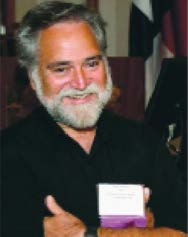RICK RADER, MD ■ EDITOR-IN-CHIEF

AADMD Policy Paper on Physician Decision Making in Intellectual and Developmental Disabilities
Developmental Disabilities The operative question should always be, "If this patient did not have an intellectual/ developmental disability, which treatment would be in the patient's best interests?"
Clinicians are often faced with difficult decision-making regarding treatment options for patients with intellectual and developmental disabilities. The options often relate to withholding treatment, providing aggressive treatment or simply watching and waiting; they can be summed up with "starting something or stopping something."
Physician decision making is the process by which clinicians review the pertinent particulars of the patient, their condition, treatment options and resources. They include evidence-based plans, guidelines, their experience, consultations and the personification of the patient. This is different from Informed Consent and Supported Decision Making, where the patient is provided the clinical picture, outcomes, options, statistics and, often, the physician's personal recommendations and their choice(s) are welcomed and respected.
Historically, these treatment decisions involve organ transplantation, referral to hospice care, inserting of feeding tubes, initiation of a ventilator, enrolling in a research program or clinical trials and placement in a longterm care facility. While these treatment dilemmas are also seen in the general patient population, the addition of an existing cognitive impairment complicates the landscape and challenges the clinician.
Dr. Harold J. Schoolman, former Deputy Director for Research and Education at the National Medical Library addressed the medical decision-making process: "A physician who is 90 per cent certain about any decision will always seek additional information in the hope that it will increase the confidence with which he makes such a decision. The decision… will be either correct or incorrect, and the outcomes is independent of the con pendent of the confidence with which the decision is reached. When additional information cannot possibly alter the decision, but only gives rise to a greater sense of comfort on the part of the physician, such additional information is of no benefit to the patient. Its only benefit is in reducing the discomfort of the physician" (New England Journal of Medicine)
It is the belief of the American Academy of Developmental Medicine and Dentistry (AADMD) that the presence of an intellectual disability should not be considered as "additional information" in the decisionmaking process. Physicians must address their own individual bias in assigning "value" to patients with intellectual and developmental disabilities.
The current prevailing ethical stronghold in the organ transplant arena is: "A patient's age, gender, religion, beauty, income, contribution to society or any other extraneous factor should not be tied to whether they receive an organ." (A. Schafer, University of Manitoba, Centre for Professional and Applied Ethics). Beyond medical ethics, this position has been upheld by the Americans with Disabilities Act (ADA). The reasons for refusing people with intellectual and developmental disabilities to receive solid organs have been discounted (they included limited life span, quality of life, compliance with postsurgical regimens and societal contribution). The criteria for recipient selection are now made without the component of the intellectual and developmental disability as a consideration co-factor.
The same holds true for referral to hospice care. The determination should be restricted to the guidelines which center around the "six months of expected life" criteria. The shorter statistically life expectancy of a person with an intellectual and ~ Roy E. Disney developmental disability should never be a justification for admis sion to hospice care. The lowered "quality of life" that is often referenced to hospice care placement (in patients with intellectual disabilities) is a reflection of bias, prejudice, judgment and other mythology.
In summary, it is the position of the American Academy of Developmental Medicine and Dentistry that all treatment-based medical decision making should be derived without the consideration of a co-existing condition involving compromised intellect. Thus, the operative question should always be, "If this patient did not have an intellectual/developmental disability, which treatment would be in the patient's best interests?"•

ANCORA IMPARO In his 87th year, the artist Michelangelo (1475 -1564) is believed to have said "Ancora imparo" (I am still learning). Hence, the name for my monthly observations and comments. — Rick Rader, MD, Editor-in-Chief, EP Magazine Director, Morton J. Kent Habilitation Center Orange Grove Center, Chattanooga, TN
IN THE BALANCE: The Doctor by Sir Luke Fildes (1887) depicts a Victorian doctor contemplating a medical decision, while observing the critical stage in a child's illness.